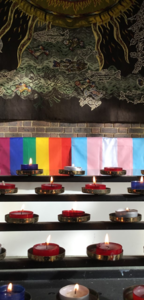Principal Investigator: Dr Esther McIntosh
Researcher: Dr Sharon Jagger
The final report for this project has now been published and can be accessed here as a free PDF: Supporting Trans and Non-Binary Staff and Students – Dr Esther McIntosh and Dr Sharon Jagger
 ‘I feel well listened to, understood, and insightfully interpreted back to myself’ – Revd Dr Christina Beardsley
‘I feel well listened to, understood, and insightfully interpreted back to myself’ – Revd Dr Christina Beardsley
‘ground-breaking … thought-provoking … refreshingly inclusive … should be required reading for anyone who teaches or works with trans and non-binary individuals’ – Dr Michael Bonshor
If you would like a hard copy of the report, or if you would like to make enquiries about workshops and presentations of this research, please email s.jagger@yorksj.ac.uk or e.mcintosh@yorksj.ac.uk
 Supporting Trans and Nonbinary Staff and Students
Supporting Trans and Nonbinary Staff and Students
This research project was funded by the Church Universities Fund and York St. John University. Focusing on Anglican Foundation universities, we explored the experiences of trans and non-binary staff and students and the support role of university chaplaincies.
The backdrop to this research is the recent debate surrounding proposed changes to the Gender Recognition Act, which attracted intense Press coverage and has contributed to the scrutiny of trans people. The Government responded to the consultation in September 2020. In addition, sexual harassment and assault on university campuses and in church communities is a current area of challenge affecting persons of all identities and sexualities. Staff and students with a faith background may turn to the chaplaincy for guidance in respect of their own beliefs and practices, their perception of the official position of their religious community, and the negotiation of their identity and sexuality with friends and family.
We are grateful for the expert input from Revd Rachel Mann and Revd Christina Beardsley, both high-profile voices in the Church of England, who write and speak extensively on their own experiences and those of trans Christians within the Church. They have shared with us detailed accounts and theological insights that draw attention to the barriers to belonging within the Church for many trans and non-binary people. The recent public Church debate around proposals for a liturgy of welcome for trans people has revealed the ambivalence of that welcome. Whilst many in the Church have expressed support for the proposal, some remain opposed, continuing a religious discourse that frames trans and non-binary identities as problematic.
In response to this context, our research question asked how chaplaincies on university campuses can support trans and non-binary students and staff, of all faiths and beliefs, and whether there were any perceived tensions in this role between university and Church institutional discourses. Our priority was to listen to the stories of trans and non-binary people to find out about and understand the support requirements that chaplaincies could meet in the university environment.
We began the research with a questionnaire inviting responses from trans and non-binary students and staff of Anglican Foundation universities, and encouraged anyone who identified under the LGBTQ+ banner to respond. Our aim was to find out what structural and systemic issues were faced on campus and what the perceptions of chaplaincy support were for those of all faiths and beliefs. We then interviewed several trans and non-binary students and staff and 14 chaplains and chaplain assistants. As our methodology revolved around social justice and generating change through knowledge, we created spaces on campuses, in partnership with chaplaincies, to provide an opportunity for trans and non-binary staff and students to share stories, express ideas and add detail of lived experience to our pool of information.
non-binary students and staff and 14 chaplains and chaplain assistants. As our methodology revolved around social justice and generating change through knowledge, we created spaces on campuses, in partnership with chaplaincies, to provide an opportunity for trans and non-binary staff and students to share stories, express ideas and add detail of lived experience to our pool of information.
We have framed our key findings as practical recommendations for chaplaincies, reflecting the stories told to us by chaplains and trans and non-binary participants in the project. These recommendations were further developed in a collaborative workshop, ensuring that trans and non-binary staff and students, as well as chaplains, shaped the recommendations and the accompanying narrative.